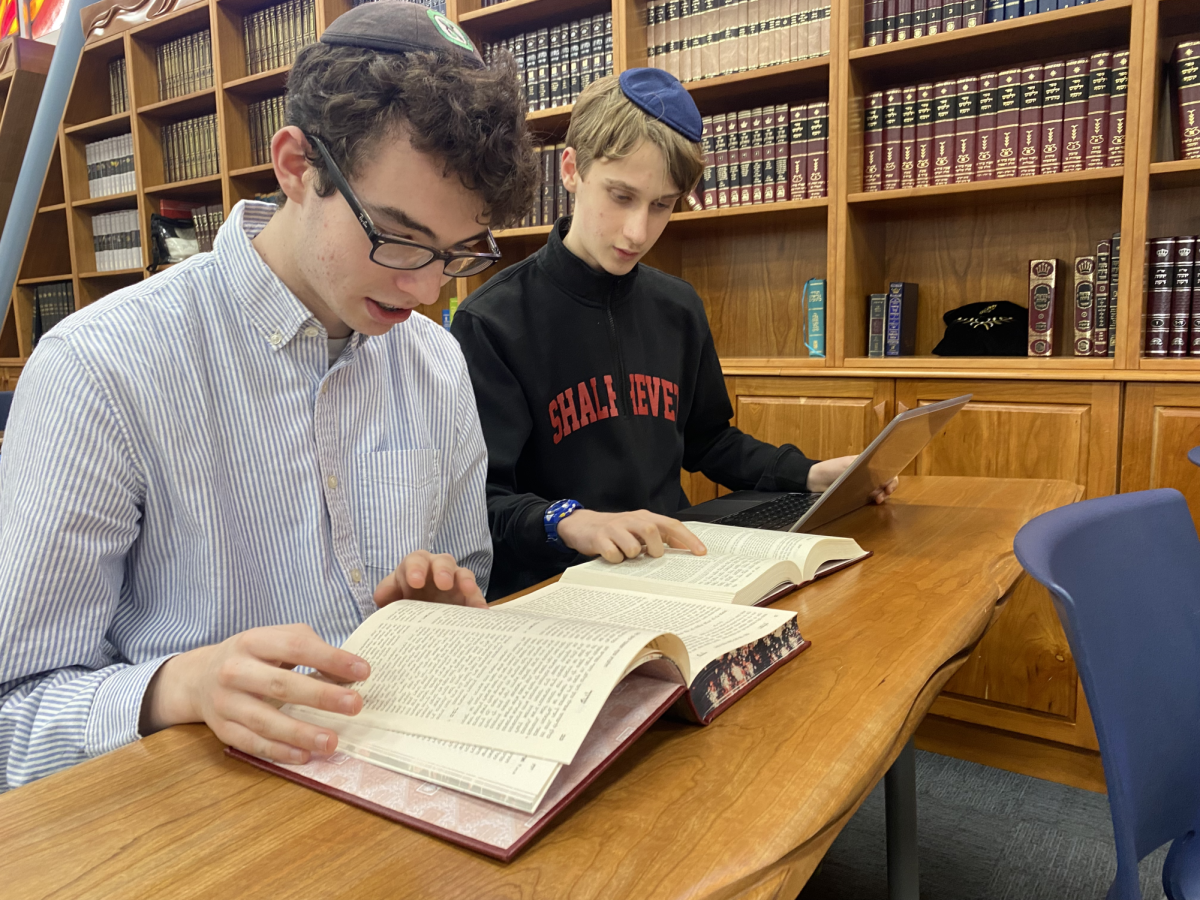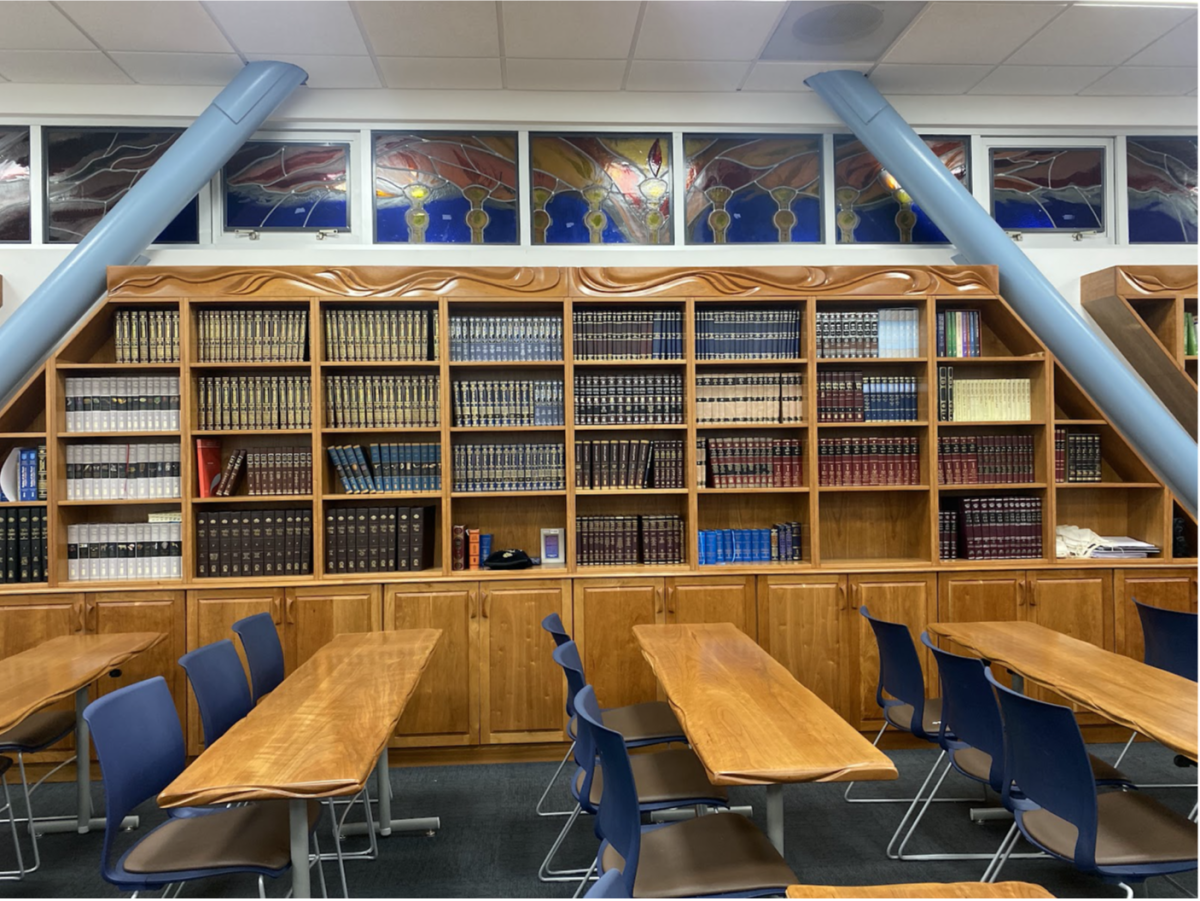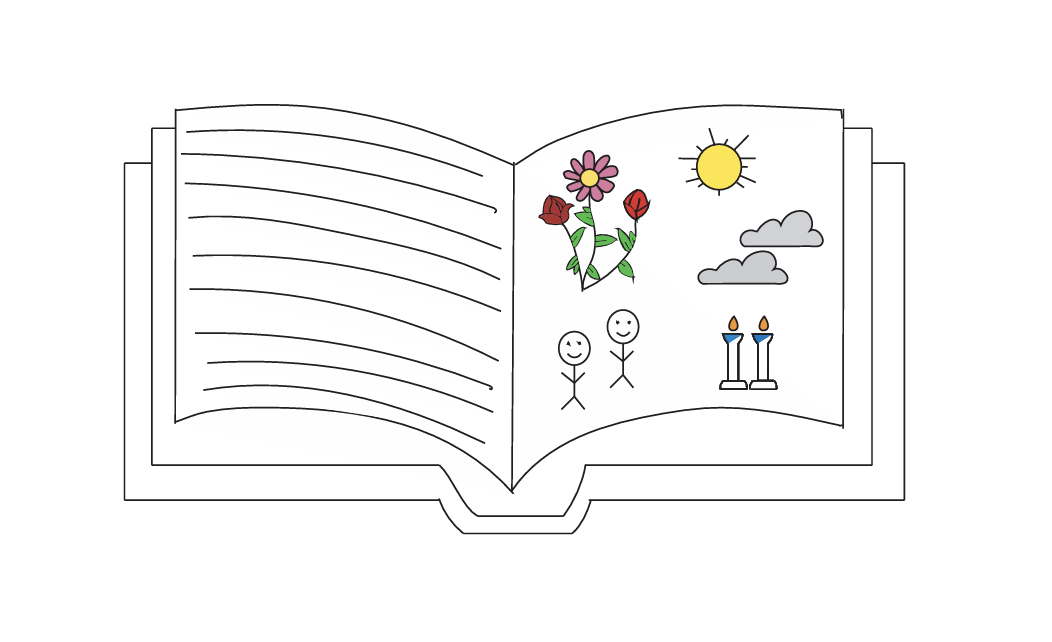JPL teacher Rabbi Ari Leubitz offers a new spin on Jewish philosophy
Ten minutes into Mincha, the seventh period Jewish Philosophy and Law class is still relatively full of seniors taking a test.
“We stay through Mincha pretty often,” explains Rabbi Ari Leubitz, the teacher of the class, as he accepts a test from a student.
Rabbi Leubitz teaches the senior Jewish Philosophy and Law class with a mission: to answer big questions – the sort of questions that have been struggled over for centuries – before the bell rings ending period seven, eight, or nine.
More commonly known as “JPL,” it is a required class that focuses on issues in Judaism such as anti-Israel propaganda and controversies regarding who wrote the Torah.
“There are certain ideas that are so crucial for students in a Modern Orthodox school to grapple with before they graduate high school,” said Rabbi Leubitz in an interview, sitting at the back of his classroom as seniors worked away at their exam. “My class provides a safe and confidential environment for students to ask whatever is on their minds.”
Though the JPL class does require a certain level of openness, students don’t hesitate to participate. Rabbi Leubitz began the unit on sexuality by having students write what they found attractive in the opposite sex on the board.
The board was soon filled with adjectives like, “easy-going,” “funny,” “hot” and “outgoing.”
Once the lists were completed, Rabbi Leubitz began explaining how the media manipulates teenagers to unwittingly involve themselves in sex and sex-related products.
“When you go online, advertising companies know that you are between the age of 14 to 17 and what gender you are,” he said, “so they show you a big blaring ad for thongs.”
Then, an argument broke out.
Senior Aliza Kellerman said that the possibility of heartbreak should not hinder someone from exploring their sexuality, and that post-marital sex was no different from premarital sex.
Rabbi Leubitz listened to Aliza’s entire argument before addressing every point specifically. He explained that the major principle involved in her argument was instant gratification versus later gratification. He explained how it applied to premarital sex and post-marital sex, and the pros and cons of each.
“Rabbi Leubitz’s class provides a comfortable mixture between a learning environment and a bunch of friends sitting around having a stimulating discussion,” said Aliza afterwards. “I think his ability to relate to the students is what makes the class so colorful.”
“The best thing about him is that he listens to your side of the argument before refuting it,” added Daniela Iskovic, another senior in the class. “Sometimes teachers jump on your words before you can finish.”
Rabbi Leubitz is very much the students’ rabbi. Though he only teaches JPL this year, he often invites his students to his house for Shabbat onegs, where they reportedly have deep discussions until the wee hours of the morning. Last month, he MC-ed SAC’s Purim Talent Show wearing a big cowboy hat and bandana.
“His class has a very relaxed environment,” adds senior Jeremy Lowe. “He has a knack for teaching contemporary halacha and blending it with traditional Judaism.”
Maybe this is partly because Rabbi Leubitz is the only Modern Orthodox-trained rabbi at Shalhevet, having received his ordination from Yeshivat Chovevei Torah in New York, one of the few Modern Orthodox yeshivas in the world.
According to the Chovevei website (www.YCTorah.org), the Modern Orthodox yeshiva believes “that the future of Orthodoxy depends on our becoming a movement that expands outward non-dogmatically and cooperatively to encompass the needs of the larger Jewish community and the world.”
“Orthodoxy can sometimes be cold and not open to other beliefs or other kinds of Jews,” Rabbi Leubitz explains. “Chovevei is an Orthodox institution, but it’s open to dialogue and discussion and interactions with non-Orthodox Jews.”
Rabbi Leubitz considers himself “open Orthodox” rather than “Modern Orthodox,” saying the latter is too general a term. Open Orthodoxy, he said, is a sect of Orthodox Judaism that is open to a pluralism of ideas and is committed to a mission of education.
The environment in which Rabbi Leubitz grew up was not unlike the one Chovevei wanted to counteract. Originally from Cleveland Ohio, he attended Yeshiva University and spent a year studying at Bar Ilan University in Israel.
“I began to see that a lot of people obey certain Jewish laws just because someone told them to,” Rabbi Leubitz says. “I realized that I could serve as a catalyst for growing a meaningful Jewish environment.”
He went on to spend a year at Yeshiva Ohr Sameach in Jerusalem and eventually received his ordination at Chovevei, moving to Los Angeles from New York three years ago with his wife, Florence, and their daughters, Elianna and Aviva, ages 6 and 4.
Rabbi Leubitz’s experiences at Chovevei and his desire to answer big questions led him to Shalhevet, which he finds to be the perfect place to teach and practice a more meaningful form of Judaism.
“Everything about Shalhevet lends itself to real dialogue – nobody takes anything on face value,” he said.
In the JPL class, every question is welcome and no topic — even those which might be considered taboo (such as sexuality, legitimacy of rabbinical law and Torah) by other Orthodox Jewish schools—is off limits.
Gamliel Kalfa, who takes JPL period 7, appreciates Rabbi Leubitz’s openness to secular opinions.
“He is one of the most open-minded Orthodox rabbis I know,” says Gamliel.
Gamliel remembers a class where they discussed the authorship of the Torah. He and Rabbi Leubitz had an in-depth argument about the subject, with Gamliel offering non-traditional views that he speculates would not have been tolerated at other Orthodox schools. He says the Rabbi respected his opinions and responded to them.
“I come from a very closed-minded Orthodox community,” says Gamliel, “where a lot of subjects are closed off from discussion. Rabbi Leubitz accepts a secular and historical understanding of basic Jewish subjects.”
Rabbi Rodney Feinerman, Shalhevet’s Director of Education and head of Judaic Studies in the high school, believes that Rabbi Leubitz’s teaching methods are completely in tandem with the Jewish tradition of asking questions.
“The Gemara, Rashi, Rambam — they all questioned everything,” Rabbi Feinerman explains. “As long as students are comfortable and are ready on an intellectual and emotional level, there shouldn’t be any off-limits topics or questions.”
Rabbi Leubitz also works at B’nai David-Judea Congregation on Pico Boulevard as associate rabbi under Rabbi Yosef Kanefsky. His job there includes doing what he calls the “typical rabbi things” such as teaching classes on Jewish law, answering congregants’ questions about Judaism, and giving Dvrei Torah before the congregation.
Though Rabbi Leubitz only works part time at both B’nai David and Shalhevet, he says that the two jobs have a very close tie-in as many of his students are also members at B’nai David.
“They can get a very open class from me at school about Jewish law,” he says, “but it’s when I see them on Shabbat that they can ‘walk the walk.’”
For example, he may have a discussion in class about whether a woman should be able to perform the same mitzvot as a man, it isn’t until a woman carries the Torah in Bnai David’s teen minyan – something that doesn’t happen at school – that it gets serious.
“In a way, the shul becomes a lab where things are tested out,” he explains.
His biggest challenge, Rabbi Leubitz said, can be when students will only accept concrete answers to questions that don’t necessarily have them.
He says that sometimes he offers a non-concrete approach to a difficult topic–such as why bad things happen to good people–and some students refuse to let go until they get a conclusive answer.
“Sometimes there is just no answer,” he says. “And some kids just can’t deal with that.”
On the other hand, answering questions – which range from Jewish law and philosophy to personal questions and problems – is actually his favorite thing about being a rabbi. He believes people’s openness with him is encouraged by his title.
“The name gives me the option to make a difference in people’s lives,” he smiles.
“I literally spend hours a week struggling with questions people ask me.”
It seems likely that the questions will keep coming. Students of all grades continue to find comfort and intellectual stimulation by talking with Rabbi Leubitz, staying through lunch, Mincha, and after school to discuss the array of questions on their mind, aching to be answered.
“I’m really looking forward to learning about the different denominations in Judaism, especially their different perspectives on certain halachas,” says senior Josh Feder. “The Orthodox explanation is hard for me to relate to, and I want to hear how other denominations interpret them.”






